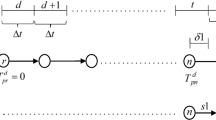Abstract
This paper investigates the route choice problem on a network with uncertain travel times along the arcs and possible blocked nodes. The route choice decision is made with the simultaneous consideration of these two kinds of nondeterministic factors. In order to deal with these nondeterministic factors, online algorithms are introduced to develop adaptive route choice strategies responding to the successively observed blocked nodes; and accordingly, an uncertain competitive analysis framework, taking expected competitive ratio as the metric, is proposed to evaluate the performances of the online algorithms associated with uncertain travel times. It is proved that the competitive analysis for this route choice problem can be handled in the framework of traditional online shortest path problem via its equivalent counterpart on the corresponding deterministic network. Furthermore, two typical online strategies, i.e., reset strategy and greedy strategy, for route choice decision-making and the resulted performance difference are analyzed in detail following from the proposed framework.



Similar content being viewed by others
Explore related subjects
Discover the latest articles, news and stories from top researchers in related subjects.References
Ben-Elia E, Avineri E (2015) Response to travel information: a behavioural review. Transport Rev 35(3):352–377
Ben-Elia E, Erev I, Shiftan Y (2008) The combined effect of information and experience on drivers’ route-choice behavior. Transportation 35(2):165–177
Borodin A, El-Yaniv R (1998) Online computation and competitive analysis. Cambridge University Press, Cambridge
Bovy PH, Stern E (1990) Route choice: wayfinding in transport networks. Kluwer Academic Publishers, Dordrecht
Chen BY, Lam WH, Sumalee A, Li Q, Shao H, Fang Z (2013) Finding reliable shortest paths in road networks under uncertainty. Netw Spat Econ 13(2):123–148
Dia H (2002) An agent-based approach to modelling driver route choice behaviour under the influence of real-time information. Transport Res C Emerg 10(5):331–349
Dijkstra EW (1959) A note on two problems in connection with graphs. Numer Math 1(1):269–271
Gao Y (2011) Shortest path problem with uncertain arc lengths. Comput Math Appl 62(6):2591–2600
Gao S, Frejinger E, Ben-Akiva M (2010) Adaptive route choices in risky traffic networks: a prospect theory approach. Transport Res C Emerg 18(5):727–740
Harks T, Heinz S, Pfetsch ME (2009) Competitive online multicommodity routing. Theor Comput Syst 45(3):533–554
Jafari E, Boyles SD (2017) Multicriteria stochastic shortest path problem for electric vehicles. Netw Spat Econ 17(3):1043–1070
Jaillet P, Wagner MR (2008) Generalized online routing: new competitive ratios, resource augmentation, and asymptotic analyses. Oper Res 56(3):745–757
Ji X (2005) Models and algorithm for stochastic shortest path problem. Appl Math Comput 170(1):503–514
Kahneman D, Tversky A (2013) Prospect theory: an analysis of decision under risk. In: Handbook of the fundamentals of financial decision making, pp 99–127
Kalyanasundaram B, Pruhs KR (1993) Constructing competitive tours from local information. Automata, languages and programming. Springer, Berlin, pp 102–113
Liu W(2010b) Uncertain programming models for shortest path problem with uncertain arc lengths. In: Proceedings of the first international conference on uncertainty theory, pp 148–153
Liu B (2007) Uncertainty theory, 2nd edn. Springer, Berlin
Liu B (2010a) Uncertainty theory: a branch of mathematics for modeling human uncertainty. Springer, Berlin
Liu B (2012) Why is there a need for uncertainty theory? J Uncertain Syst 6(1):3–10
Ma WM, Chen GQ (2005) Competitive analysis for the on-line fuzzy shortest path problem. In: Proceedings of 2005 international conference on machine learning and cybernetics, pp 862–867
Ma WM, Tang SH, Wang K (2008) Competitive analysis for the most reliable path problem with online and fuzzy uncertainties. Int J Pattern Recogn Artif Intell 22(01):195–206
Niroomand S, Mahmoodirad A, Heydari A, Kardani F, Hadi-Vencheh A (2017) An extension principle based solution approach for shortest path problem with fuzzy arc lengths. Oper Res Ger 17(2):395C–411
Okada S, Gen M (1994) Fuzzy shortest path problem. Comput Ind Eng 27(1–4):465–468
Okada S, Soper TA (2000) Shortest path problem on a network with fuzzy lengths. Fuzzy Set Syst 109:129–140
Papadimitriou CH, Yannakakis M (1991) Shortest paths without a map. Theor Comput Sci 84:127–150
Schmidt M, Kroon L, Schobel A, Bouman P (2017) The travelers route choice problem under uncertainty: dominance relations between strategies. Oper Res 65(1):184–199
Sleator DD, Tarjan RE (1985) Amortized efficiency of list update and paging rules. Commun ACM 28:202–208
Waller ST, Ziliaskopoulos AK (2002) On the online shortest path problem with limited arc cost dependencies. Networks 40(4):216–227
Wang L, Yang L, Gao Z (2016) The constrained shortest path problem with stochastic correlated link travel times. Eur J Oper Res 255(1):43–57
Xu H, Yang H, Zhou J, Yin Y (2017) A route choice model with context-dependent value of time. Transport Sci 51(2):536–548
Yang J, Jiang G (2014) Development of an enhanced route choice model based on cumulative prospect theory. Transport Res C Emerg 47:168–178
Yu G, Yang J (1998) On the robust shortest path problem. Comput Oper Res 25(6):457–468
Zhang Y, Liu P, Yang L, Gao Y (2015) A bi-objective model for uncertain multi-modal shortest path problems. J Uncertain Anal Appl. https://doi.org/10.1186/s40467-015-0032-x
Zheng X, Wang K, Ma W (2017) Value of foreknowledge in the online k-taxi problem. Int J Mach Learn Cyb 8(4):1185–1195
Zhou J, Yang F, Wang K (2014) An inverse shortest path problem on an uncertain graph. J Networks 9(9):2353–2359
Zhou J, Chen L, Wang K (2015) Path optimality conditions for minimum spanning tree problem with uncertain edge weights. Int J Uncertain Fuzzy Knowl Based Syst 23(1):49–71
Zhou J, Yi X, Wang K, Liu J (2016) Uncertain distribution-minimum spanning tree problem. Int J Uncertain Fuzzy Knowl Based Syst 24(4):537–560
Acknowledgements
This work was supported in part by Grants from the Ministry of Education Funded Project for Humanities and Social Sciences Research (no. 14YJC630124) and the National Natural Science Foundation of China (no. 71501123).
Author information
Authors and Affiliations
Corresponding author
Rights and permissions
About this article
Cite this article
Wu, L., Ma, W., Yang, Y. et al. A competitive analysis approach for route choice with uncertain travel times and blocked nodes. J Ambient Intell Human Comput 10, 345–355 (2019). https://doi.org/10.1007/s12652-018-0780-9
Received:
Accepted:
Published:
Issue Date:
DOI: https://doi.org/10.1007/s12652-018-0780-9




